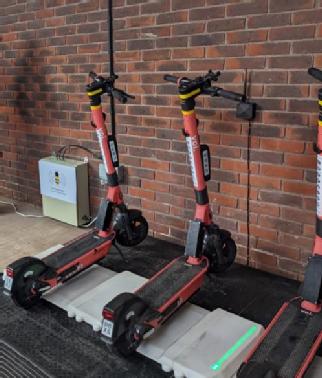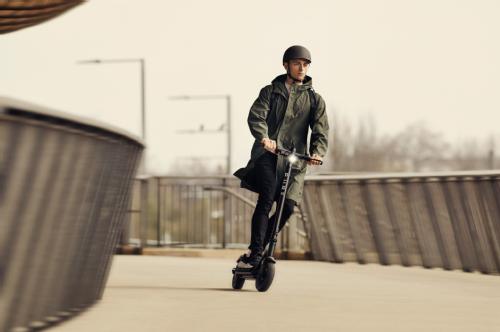New research from WMG looks into e-bike and e-scooter battery safety
Following a rise in e-bike and e-scooter battery fires in the UK, WMG researchers have been researching the future of battery safety.
An independent report from The Office for Product Safety and Standards (OPSS) commissioned WMG at The University of Warwick to produce research on the risks associated with unsafe e-bike and e-scooter batteries and chargers.
The report outlines how battery failures occur, processes and materials that achieve safer design and use of batteries, and potential shortcomings in product standards.
Micromobility UK is back!
 WMG at the University of Warwick is hosting Micromobility UK, on Wednesday 18th September, at the Oculus building located on the Warwick campus. This will be the largest in-person conference, in the UK, focussing purely on micromobility.
WMG at the University of Warwick is hosting Micromobility UK, on Wednesday 18th September, at the Oculus building located on the Warwick campus. This will be the largest in-person conference, in the UK, focussing purely on micromobility.
Sponsored by NatWest, the event will also showcase the Clean Transport Accelerator – a programme supporting businesses to develop products and services to help address the UK’s net-zero goals.
Visitors can expect to see a jam-packed agenda with speakers on topics such as last-mile logistics; accessibility and inclusion; battery safety and future e-scooter regulations.
Discussions will also be held around making towns and cities safer for all micromobility, from scooters to larger cargo vehicles.
Expert speakers include:
- Julian Scriven, Managing Director, Brompton Bike Hire
- Katie Miller-White, Transport Innovation Coordinator, Transport for West Midlands
- Caz Conneller, Director of Community and Culture, Loud Mobility
- Adam Norris, Founder, Pure Electric
- Peter Eland, Technical Manager, The Bicycle Association of Great Britain
- Michelle Gardner, Deputy Director of Policy, Logistics UK
- Robin Haycock, Chief Technology Officer, Fernhay
- Kay Inckle, Campaigns and Policy Manager, Wheels for Wellbeing
- Andrew Bradley, Net Zero & Transport Lead, NHS
- George Beard, Head of New Mobility, TRL
- Lizzie Gaden, E-Scooter Trial Stakeholder & Contracts Manager, Transport for London
- Shayan Yaghoobi, Engineering Lead, Office for Product Safety and Standards, DBT
- Kevin Savage, COO, Delivery Mates
- Alfie Brierley, Director of Policy and Public Affairs, Motor Cycle Industry Association
- Rob Hill, Fire Investigation Officer, London Fire Brigade
- Phil Ellis, Cofounder, Beryl
- Mark Riley, Delivery Design Manager, Royal Mail
Exhibitors include Composite Braiding, if.vehicles, Ebco, Bo Mobility, MTD Ltd, AlsoBikes, DOCK-Y, Warwick University Science Park, Eskuta, Spokesafe, Komodo Bikes, Business Growth West Midlands, Maeving, Coventry and Warwickshire Growth Hub, Transport for West Midlands and Beryl. There will also be live demos and the chance to trial micromobility vehicles around a dedicated route.
Komodo Bikes, Business Growth West Midlands, Maeving, Coventry and Warwickshire Growth Hub, Transport for West Midlands and Beryl. There will also be live demos and the chance to trial micromobility vehicles around a dedicated route.
Professor David GreenwoodLink opens in a new window, Director of Industrial Engagement at WMG and CEO of the High Value Manufacturing Catapult at WMG, said, “We are absolutely delighted to host the 4th annual Micromobility UK conference.
“This year is going to be an important one for micromobility. We now have a new government and feel optimistic that we will see new policies around micromobility enabling the sector to really flourish.”
To register for the event visit: https://warwick.ac.uk/fac/sci/wmg/news-and-events/events/micromobilityuk/Link opens in a new window
Mark Urbanowski, Principal Engineer, responds to the Government’s proposed cuts to active travel funding budgets
 Expert comment from Mark Urbanowski.
Expert comment from Mark Urbanowski.
Mark Urbanowski, Principal Engineer at WMG at the University of Warwick, said: “Travelling around the UK’s towns and cities is getting increasingly congested, polluted and unsafe. A key part of the solution to this problem, along with helping reach the UK’s Net Zero goal, is getting people and goods moved in efficient and clean vehicles, correctly sized for the journey, passenger and job requirements.
“Active travel, walking and cycling, as well as emerging micromobility transport options like e-bikes, e-cargo vehicles and e-scooters, need the right infrastructure to make them convenient and safe to use. Without investment for infrastructure and integration into the broader public transport system, modal shift to these vehicle types; by commuters, families and businesses; will languish behind the rest of Europe. It’s an issue we will be addressing at our Micromobility event in May.”
Voi and Bumblebee Power partner on UK’s first wireless e-scooter charging trial launched at the University of Warwick
- Time-consuming and resource-intensive charging processes could be replaced by wireless charging for e-scooter rental fleets
- The ease of use for consumers and a reduction in operating costs through wider adoption of this technology would be a big advantage for the UK’s biggest rental scheme operator, Voi
- Trial in partnership with Bumblebee Power and WMG on the University of Warwick campus allows real-world testing in a ‘mini-city’ environment
- A successful trial will pave the way for seamless and convenient charging of e-scooters
Voi Technology, the UK’s largest e-scooter rental operator, has partnered with Bumblebee Power and WMG to trial the use of Bumblebee’s wireless e-scooter charging at the University of Warwick campus over a 6-month period potentially changing the future of the micromobility industry.
As with the charging of electric cars, the charging of e-scooters is a challenge for the operators of extensive rental schemes. The batteries powering their zero-emissions e-scooters are currently charged safely at their warehouse; however, they are replaced when vehicles are either receiving their regular in-house inspections or by the company’s in-field team who visit each e-scooter to perform fresh battery swaps.
These processes can lead to high operating costs for their business as the processes can be both time-consuming and often resource-intensive by requiring additional warehouse infrastructure for safe battery charging as well as transportation costs. Therefore, Voi began exploring new charging methodologies as a result that could provide the same excellent user experience whilst also delivering a similar vehicle efficient and effective battery performance. The potential solution: wireless charging.
additional warehouse infrastructure for safe battery charging as well as transportation costs. Therefore, Voi began exploring new charging methodologies as a result that could provide the same excellent user experience whilst also delivering a similar vehicle efficient and effective battery performance. The potential solution: wireless charging.
In partnership with Bumblebee Power, the wireless charging pads make it possible to charge e-scooters where they are parked, reducing not only operational costs but make their integration into the street and transport infrastructure more streamlined, making the modal shift to a convenient and flexible mode of transport easier for new and existing riders.
The University of Warwick campus ‘mini-city’ environment has been selected for this trial and provides an excellent, safe test bed for testing transport innovations. Available to estate staff only, a busy environment with a large population of students, staff, and industrial partners means the University of Warwick is an ideal ‘living lab’ environment to enable sustainable research and development of this technology.
The trial will provide data on the wireless system performance as well as user behaviour and interaction with the technology, which is crucial to any future large-scale deployment. If the trial proves successful it could be expanded to cover more of the Voi fleet across the UK.
David Yates, CTO of Bumblebee Power explains:
“The Bumblebee patented technology, which originated from Imperial College London, provides automatic connection via a very efficient wireless charging system, saving operational expenditure for the fleet operator by eliminating battery swaps. In addition, it makes possible the ability to extend the battery’s life, by controlling the charging regime whilst maximising vehicle availability.”
Sam Pooke, Senior Policy Manager at Voi UK and Ireland, said:
“We’re delighted to be partnering with Bumblebee Power to develop wireless charging for our e-scooters, an innovation that could change the whole micromobility industry.
“Applying this technology has the potential to not only reduce the operational impact of how we charge batteries for our vehicles but also in making an already convenient and flexible service even more accessible for new and existing riders. Over the coming months, we’ll look forward to working with our partners to maximise the innovative potential of this technology.”
David Evans, Lead Engineer at WMG, University of Warwick, said:
“Wireless charging technology for micromobility has the potential to reduce operational costs for fleet operators and provide a convenient charging solution for users. The University of Warwick campus is an ideal location to trial transport innovations such as these, providing a real world, mini city environment with world class teaching and research facilities.”
University of Warwick proposes new quality and safety regulations report for micromobility vehicles

• Legal framework proposed by researchers at the University of Warwick lays out how future micromobility vehicles such as eScooters could be designed and operated in the UK by mid-2023.
• New standards would require manufacturers to develop safer and better quality vehicles.
• The roadmap proposes new powers of enforcement to deter antisocial and illegal use.
• Conclusions were drawn from a wide-ranging consultation with over 100 organisations.
The UK is the last major Western economy not to legislate ‘Powered Micro Vehicles’. The University of Warwick wants to change that and has proposed a new set of regulations for allowing micromobility vehicles, such as e-scooters to operate legally in the UK. The report looks at ways to improve the quality and safety of models available, as well as providing clear guidance for authorities to deal with unsafe behaviour.
WMG researchers at the University of Warwick, with support from Cenex, has published ‘Micromobility, a UK roadmap’. It is a regulatory framework that provides a set of standards for eScooters, a cargo variant and other micro vehicles, to be operated legally in the UK, which is aimed at supporting regulatory change through parliament.
100 organisations representing road users, safety groups, transport authorities and industry have helped shape the roadmap. If the roadmap was adopted, the public could legally operate eScooters and other micromobility vehicles by mid-2023.
Micromobility is a key part of achieving net-zero emissions for transport. For many journeys, particularly short journeys, walking or using micromobility are much better for the environment than using a car. The economic benefits are also compelling both in the cost of the vehicle and the manufacturing opportunities. Without change many manufacturers may leave the country.
The key recommendations of the roadmap are:
• The creation of a new vehicle category “Powered Micro Vehicles” and three initial new vehicle types in the category: eScooter, Light Electric Cargo Vehicle, Electric Light Moped.
• Specific standards and regulations for each vehicle type, including speed limits and weight limits.
• Vehicles must be registered and be visually identifiable.
• Cardinal design requirements around minimum wheel size and redundancy of braking systems, so there is a secondary method of slowing the vehicle down.
• Daytime running lights, a sound emitter and indicators are required to improve visibility for current road users.
• No use on the pavement in any circumstance, and instead use on roads and cycle-ways.
• Minimum ages for operating the vehicles, and PPE recommendations.
• New powers for local policing and PCSOs in England and Wales, to fine breaches and illegal use.
Lead author John Fox, Programme Director at WMG at the University of Warwick, said “The purpose of the 'Micromobilty, a UK roadmap’, is to provide regulations on how powered micromobility vehicles could be designed and operated in the UK.
“It’s important that these vehicles are high quality, safe, and legal. They can provide a low-carbon mobility option which is available to everybody, allowing us to make choices about how we travel, and stimulating future innovation which will accelerate a market for UK manufacturers.”
Robert Evans, CEO at Cenex comments, “In order to lower emissions from transport, it is crucial we find a way forward that allows the UK micromobility market to grow sustainably and safely for all.
“The growth in e-bike use and the popularity of e-scooter trials have demonstrated that electric powered micro vehicles will have a significant role in our future transport systems. The right legislation and regulations must enable this whilst minimising any potential negative impacts.
“Cenex is proud to have supported WMG in this work and looks forward to seeing the benefits and impacts.”
Richard Dilks, Chief Executive at CoMoUK, said “Further to our recent letter to the Transport Secretary, CoMoUK sees a clear need for legislation to fill the void we currently have over micromobility options such as escooters beyond the welcome rental scheme trials. We welcome the announcement from the Transport Secretary that the Government intends to legislate. We need all the options we can lay our hands on to reduce our over-reliance on private cars in particular and motorised mileage in general, and proposals such as these help put flesh on the bones of how we can fill the gap.”
Adam Norris, Founder of Pure Electric, said, “As Europe’s largest e-scooter retailer we are working hard to support the Government with bringing in legislation. The UK still remains the only large economy not to have legalised and regulated private e-scooters. It is frustrating that the UK has fallen behind the rest of Europe, however, the detailed work from the experts at the University of Warwick demonstrates that the UK has the potential to become a world leader in micro-mobility.”
Over the course of six months, the researchers held five workshops with over 100 organisations represented. Participants came from a broad range of stakeholders, including user groups – such as road safety groups, charities and cycling groups - service providers, vehicle developers and manufacturers, local and regional transport authorities, and policymakers. These workshops examined a range of options covering vehicle types, vehicle safety, maximum speeds, to try and form a consensus.
• The roadmap is available online: short version and long version
• The image (taken on private land) is courtesy of Pure Electric.
WMG is hosting its 2nd micromobility event on 9th June where the roadmap will be debated by key industry stakeholders. The event will also feature the latest data from industry and technology experts, with the opportunity to trial some of the latest micromobility solutions
